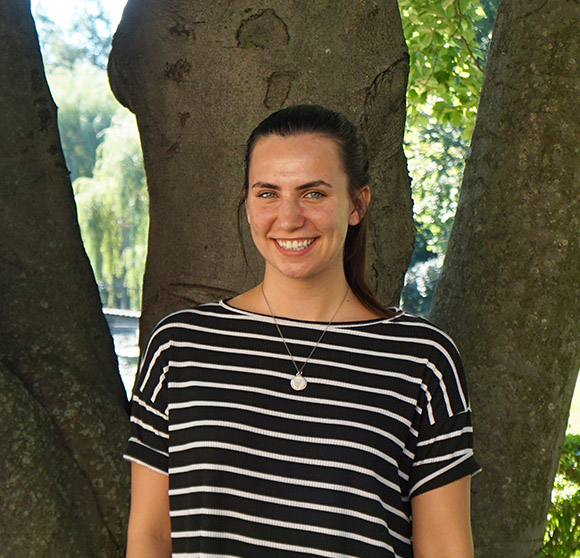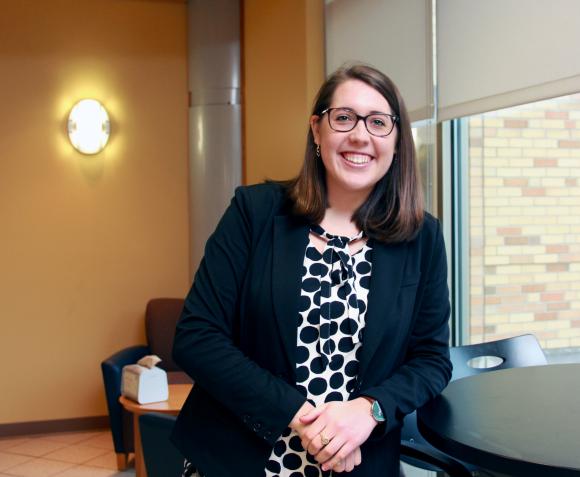When asked what fields and disciplines are associated with statistics and digital technology, I never would have thought to provide my own degree in the humanities as my immediate answer. Before my studies at Saint Mary’s College, I certainly would not have associated the two. I went into the humanities thinking that it was a path that asked little of any computer skills besides being able to word process my papers and conduct online research.
The more humanities courses I took, though, I learned about the emerging field of digital humanities, particularly about the ways the field could enrich my degree. Despite my hesitation to implement technology in my research and papers and my initial confusion with how it could even be associated with my English literature and writing majors, I was intrigued. I found myself, someone who has a very rudimentary literacy with computers and a strong affinity towards paper and physical texts, wanting to dive deeper into this digital world.
INDIANA DIGITAL HUMANITIES RESEARCH INSTITUTE
The Indiana Digital Humanities Research Institute (DHRI) was a four-day workshop held at the campuses of Saint Mary’s College and the University of Notre Dame by Sarah Noonan, assistant professor of English at Saint Mary’s College, and Daniel Johnson, English literature and digital humanities librarian at Notre Dame, with the aid of a grant from Indiana Humanities. When I received an email calling undergraduate students to apply, I did so at once. I saw it as a great opportunity to expand my knowledge on such an innovative and perplexing topic and, soon after, I was selected as a participant — the only undergraduate among graduate students, professors, and other professionals from across the nation. I felt intimidated by the intellect of those I would be surrounded by. I knew next to nothing about the digital humanities — I wasn’t even sure I could provide a stable definition of it if asked — and assumed that everyone else’s knowledge would far surpass mine.
A few hours into the research institute, though, I found my assumption to be not necessarily true. While there were attendants who knew a great amount about the field, there were many who attended out of curiosity and a desire to learn — just like myself. This reality dissipated my anxiety and I relaxed enough to join in the group discussion. I viewed myself as a peer of the graduate students and professors rather than subsidiary to them.
WHAT IS DIGITAL HUMANITIES?
I quickly found that I did not need to feel ashamed by my inability to define digital humanities. The meaning can be difficult to grasp simply because it is so new, involves so much, and can differ based on the discipline it is being applied to.
Put simply, the digital humanities is an application of digital tools and resources on humanistic disciplines. Still, it can be difficult to imagine what kind of tools can be utilized in relation to the humanities, a vast discipline that explores how people process and document the human experience. As one can imagine, there are a lot of different ways the two correlate. The humanities are some of the oldest academic disciplines — since humans have been able, we have used philosophy, literature, religion, art, music, history, and language to understand and record our world. Because of our societal advancements, those ancient traditions are now able to meet the technological and digital age.
At DHRI, I learned about different software that could aid digital humanities projects and was guided through hands-on seminars on how to work with such software. I gained computer programming skills with programs I would have never thought would be used in conjunction with my English degree such as command-line, Python, HTML, and so much more.
While I do not claim to be an expert user of these tools, what the DHRI provided for me was the introductory knowledge to many different digital platforms which will make it easier for me to understand key terms and commands essential to further expand these skills on my own, as well as a community to reach out to for help and to share ideas and future projects with.
A FUTURE WITH DIGITAL HUMANITIES
We live in a world that is rapidly changing. Part of the work of the humanities is to respond to this change while remaining rooted in old traditions. Humanistic projects reflect this work: How do the political issues presented in Shakespeare’s plays relate to current issues? Where in society is Aristotelian thinking still implemented? How can we turn to digital tools to assist such thinking and create projects out of it?
Well, there are many ways and many projects already created answering humanistic questions such as these with the assistance of digital tools. A team of faculty, staff, and students at Saint Mary’s are embarking on a project titled “Refuge(es): Telling the Story of Global Displacement Through the Archive of the Sisters of the Holy Cross” that involves digitizing the archives of the Sisters of the Holy Cross to make their history more widely available. The project directly responds to the current global migration crisis and hopes to foster community discussion of this pressing issue. In fact, beginning May 2020, there will be a student and faculty curated exhibit at the History Museum of South Bend based on the project to share the refugee work being done with the larger community and initiate that conversation. With this project, there is hope that our students and community can emulate the Sisters and learn from their work — work that directly influences the mission of the College.
Social responsibility is an essential part of a Saint Mary’s education. Each student and discipline responds to this call in a different way. As a rising senior, I look forward to utilizing the skills I learned at DHRI in my senior comprehensive project and brainstorming what future projects I can devise in order to do the traditional work of the humanities by documenting the human experience and implementing change in our digital world.
The DHRI and the field of the digital humanities not only taught me the skills necessary to do this work, but it opened my eyes as to how I can directly respond to the issues in our changing world with my humanities degree. Whether I respond by furthering my education in a digital humanities graduate program to expand these skills or by jumping right into planning my own project, similar to that of “Refuge(es),” I am unsure. What I do know is that participating in INDHRI has only strengthened the pride I hold for my humanities degree and makes me increasingly eager to enter the world beyond Saint Mary’s to do with my education what I was prepared to do: make a difference.
 Kaitlin Emmett '20
Kaitlin Emmett '20
Kaitlin Emmett '20 is studying English literature and writing. She uses her knowledge of writing by tutoring students at the College's Writing Center. She is also a member of the editorial board of Saint Mary's literary and art journal, Chimes, is Assistant Editor of the nonfiction journal, The Avenue, and has previously had her own work published in both. As a writing major, Kaitlin is captivated by the power words have in creating connections between individuals and groups of people. She is particularly interested in writing poetry but also has experience in creative nonfiction, however, she'll read any genre.

